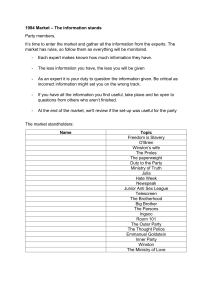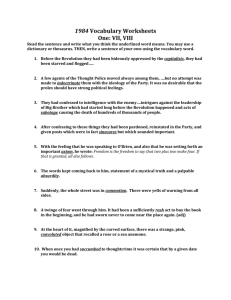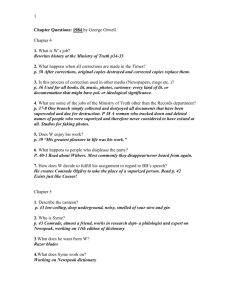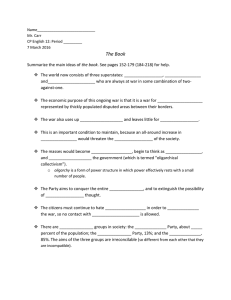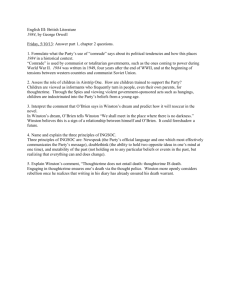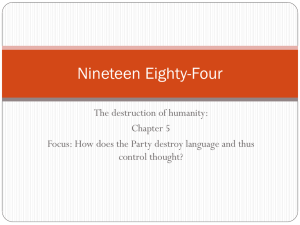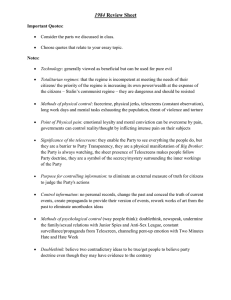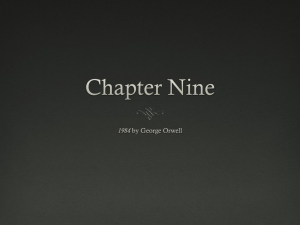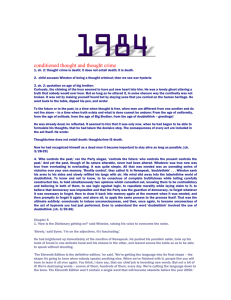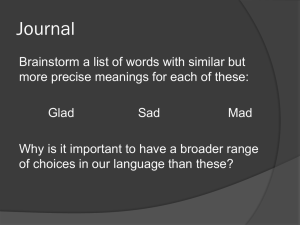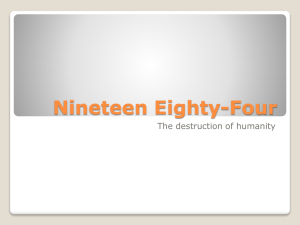Year 11 English Study of Context: 'Visions of the Future' 1984 by
advertisement
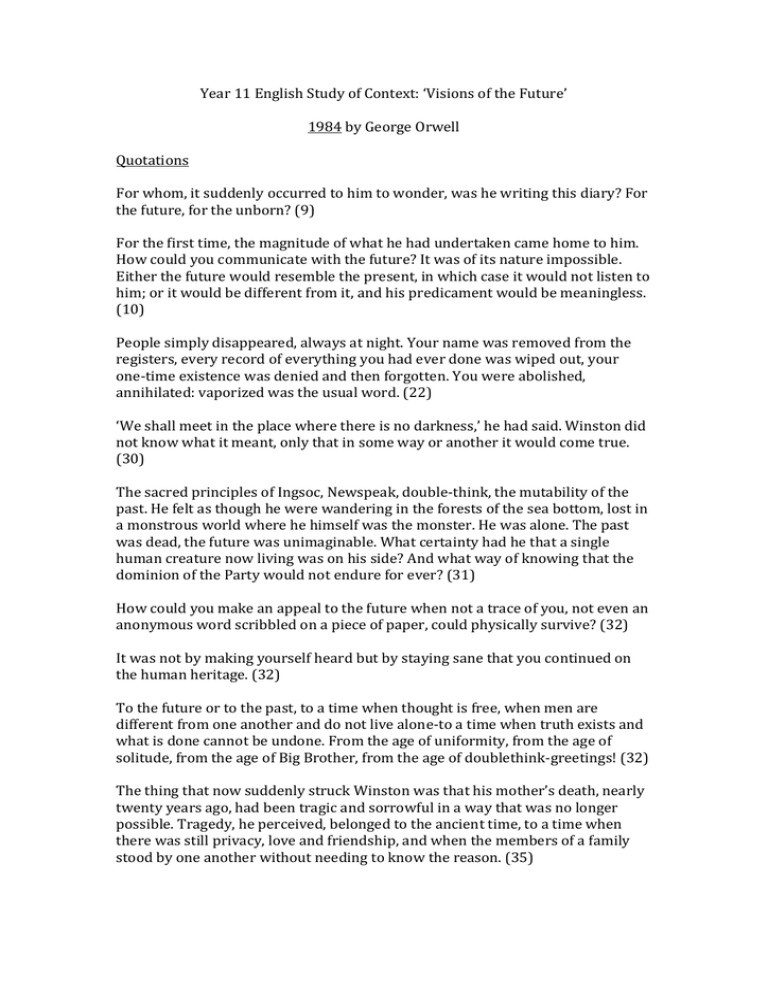
Year 11 English Study of Context: ‘Visions of the Future’ 1984 by George Orwell Quotations For whom, it suddenly occurred to him to wonder, was he writing this diary? For the future, for the unborn? (9) For the first time, the magnitude of what he had undertaken came home to him. How could you communicate with the future? It was of its nature impossible. Either the future would resemble the present, in which case it would not listen to him; or it would be different from it, and his predicament would be meaningless. (10) People simply disappeared, always at night. Your name was removed from the registers, every record of everything you had ever done was wiped out, your one-time existence was denied and then forgotten. You were abolished, annihilated: vaporized was the usual word. (22) ‘We shall meet in the place where there is no darkness,’ he had said. Winston did not know what it meant, only that in some way or another it would come true. (30) The sacred principles of Ingsoc, Newspeak, double-think, the mutability of the past. He felt as though he were wandering in the forests of the sea bottom, lost in a monstrous world where he himself was the monster. He was alone. The past was dead, the future was unimaginable. What certainty had he that a single human creature now living was on his side? And what way of knowing that the dominion of the Party would not endure for ever? (31) How could you make an appeal to the future when not a trace of you, not even an anonymous word scribbled on a piece of paper, could physically survive? (32) It was not by making yourself heard but by staying sane that you continued on the human heritage. (32) To the future or to the past, to a time when thought is free, when men are different from one another and do not live alone-to a time when truth exists and what is done cannot be undone. From the age of uniformity, from the age of solitude, from the age of Big Brother, from the age of doublethink-greetings! (32) The thing that now suddenly struck Winston was that his mother’s death, nearly twenty years ago, had been tragic and sorrowful in a way that was no longer possible. Tragedy, he perceived, belonged to the ancient time, to a time when there was still privacy, love and friendship, and when the members of a family stood by one another without needing to know the reason. (35) The enemy of the moment always represented absolute evil, and it followed that any past or future agreement with him was impossible. (40) ‘Who controls the past,’ ran the Party slogan, ‘controls the future: who controls the present controls the past.’ (40) It was therefore necessary to rewrite a paragraph of Big Brother’s speech, in such a way as to make him predict the thing that had actually happened. (45) Day by day and almost minute by minute the past was brought up to date. In this way, every prediction of the Party could be shown by documentary evidence to have been correct; not was any item of news, or any expression of opinion, which conflicted with the needs of the moment, ever allowed to remain on record. (47) We’re destroying words-scores of them, hundreds of them, every day. We’re cutting the language down to the bone. The Eleventh Edition won’t contain a single word that will become obsolete before the year 2050. (59) ‘Don’t you see that the whole aim of Newspeak is to narrow the range of thought? In the end we shall make thoughtcrime literally impossible, because there will be no words in which to express it.’ (60) ‘Has it ever occurred to you, Winston, that by the year 2050, at the very latest, not a single human being will be alive who could understand such a conversation as we are having now?’ (61) He meditated resentfully on the physical texture of life. Had it always been like this? Had food always tasted like this? (68) Why should one feel it to be intolerable unless one had some kind of ancestral memory that things had once been different? (69) Heavy physical work, the care of home and children, petty quarrels with neighbours, films, football, beer and above all, gambling, filled up the horizons of their minds. To keep them in control was not difficult. It was not desirable that the proles should have strong political feelings. All that was required of them was a primitive patriotism which could be appealed to whenever it was necessary to make them accept longer working-hours or shorter rations. (82) It struck him that the truly characteristic thing about modern life was not its cruelty and insecurity, but simply its bareness, its dinginess, its listlessness. Life, if you looked about you, bore no resemblance to the lies that streamed out of the telescreens, but even to the ideals that the Party was trying to achieve. (84) It was assumed that when he was not working, eating or sleeping he would be taking part in some kind of communal recreation: to do anything that suggested a taste for solitude, even to go for a walk by yourself, was always slightly dangerous. There was a word for it in Newspeak: ownlife, it was called, meaning individualism and eccentricity. (94) But if there was hope, it lay in the proles. You had to cling on to that. When you put it in words it sounded reasonable: it was when you looked at the human beings passing you on the pavement that it became an act of faith. (99) It was a wild, impossible notion, to be abandoned as soon as thought of; but the room had awakened in him a sort of nostalgia, a sort of ancestral memory. (111) When once you had succumbed to thoughtcrime it was certain that by a given date you would be dead. Why then did that horror, which altered nothing, have to lie embedded in future time? (117) The place where there is no darkness was the imagined future, which one would never see, but which, by foreknowledge, one could mystically share in. (118) Part II Winston picked his way up the lane through dappled light and shade, stepping out into pools of gold wherever the boughs parted. Under the trees to the left of him the ground was misty with bluebells. The air seemed to kiss one’s skin. It was the second of May. From somewhere deeper in the heart of the wood came the droning of ring-doves. (135) No emotion was pure because everything was mixed up with fear and hatred. Their embrace had been a ballet, the climax a victory. It was a blow struck against the Party. It was a political act. (145) He wondered vaguely how many others like her there might be in the younger generation-people who had grown up in the world of the Revolution, knowing nothing else, accepting the Party as something unalterable, like the sky, not rebelling against its authority but simply evading it, as a rabbit dodges a dog. (150) The family had become in effect an extension of the Thought Police. It was a device by means of which everyone could be surrounded night and day by informers who knew him intimately. (153) She did not understand that there was no such thing as happiness, that the only victory lay in the far future, long after you were dead, that from the moment of declaring war on the Party it was better to think of yourself as a corpse. (156) As he sat waiting on the edge of the bed he thought again of the cellars of the Ministry of Love. It was curious how that predestined horror moved in and out of one’s consciousness. There it lay, fixed in future time, preceding death as surely as 99 precedes 100. One could not avoid it, but one could perhaps postpone it: and yet instead, every now and again, by a conscious, willful act, one chose to shorten the interval before it happened. (161) One had the feeling that she would have been perfectly content, if the June evening had been endless and the supply of clothes inexhaustible, to remain there for a thousand years, pegging out diapers and singing rubbish. (163) To hang on from day to day and from week to week, spinning out a present that had no future, seemed an unconquerable instinct, just as one’s lungs will always draw the next breath so long as there is air available. (175) She did not feel the abyss opening beneath her feet at the thought of lies becoming truths. (177) Talking to her, he realised how easy it was to present an appearance of orthodoxy while having no grasp of what orthodoxy meant. In a way, the worldview of the Party imposed itself most successfully on people incapable of understanding it. They could be made to accept the most flagrant violations of reality, because they never fully grasped the enormity of what was demanded of them, and were not sufficiently interested in public events to notice what was happening. By lack of understanding they remained sane. (180) What was happening was only the working-out of a process that had started years ago. The first step had been a secret, involuntary thought, the second had been the opening of the diary. He had moved from thoughts to words, and now from words to actions. The last step was something that would happen in the Ministry of Love. He had accepted it. The end was contained in the beginning. (184) But if the object was not to stay alive but to stay human, what difference did it ultimately make? They could not alter your feelings: for that matter you could not alter them yourself, even if you wanted to. They could lay bare in the utmost detail everything that you had done or said or thought; but the inner heart whose workings were mysterious even to yourself, remained impregnable. (193) ‘There is no possibility that any perceptible change will happen within our own lifetime. We are the dead. Our only true life is in the future. We shall take part in it as handfuls of dust and splinters of bone. Bit how far away that future may be, there is no knowing. It might be a thousand years. At present nothing is possible, except to extend the area of sanity little by little. We cannot act collectively. We can only spread our knowledge outwards from individual to individual, generation after generation. In the face of the Thought Police, there is no other way.’ (204) The best books, he perceived, are those that tell you what you know already. (229) The possibility of enforcing not only complete obedience to the will of the State, but complete uniformity of opinion on all subjects, now existed for the first time. (235) In Oceania there is no law. Thoughts and actions which, when detected, mean certain death are not formally forbidden, and the endless purges, arrests, tortures, imprisonments and vaporisations are not inflicted as punishments for crimes which have actually been committed, but are merely the wiping-out of persons who might perhaps commit a crime at some time in the future. A Party member is required to have not only the right opinions, but the right instincts. (241) The mutability of the past is the central tenet of Ingsoc. Past events, it is argued, have no objective existence, but survive only in written records and in human memories. The past is whatever the records and the memories agree upon. And since the Party is in full control of all records, and in equally full control of the minds of its members, it follows that the past is whatever the Party chooses to make it. (242) It was curious to think that the sky was the same for everybody, in Eurasia or Eastasia as well as here. And the people under the sky were also very much the same-everywhere, all over the world, hundreds of thousands of millions of people just like this, people ignorant of one another’s existence, held apart by walls of hatred and lies, and yet almost exactly the same-people who had never learned to think but who were storing up in their hearts and bellies and muscles the power that would one day overturn the world. If there was hope, it lay in the proles! Without having to read to the end of the book, he knew that that must be Goldstein’s final message. The future belonged to the proles. (251) Out of those mighty loins a race of conscious beings must one day come. You were the dead; theirs was the future. But you could share in that future if you kept alive the mind as they kept alive the body, and passed on the secret doctrine that two plus two make four. (252) Some dreadful thing which had lain embedded in the future had somehow been skipped over and had not happened. (279) ‘It is intolerable to us that an erroneous thought should exist anywhere in the world, however secret and powerless it may be. Even in the instant of death we cannot permit any deviation.’ (292) ‘Power is not a means, it is an end. One does not establish a dictatorship in order to safeguard a revolution; one makes the revolution in order to establish a dictatorship. The object of persecution is persecution. The object of torture is torture. The object of power is power.’ (302) ‘We have cut the links between man and woman. No one dares trust a wife or a child or a friend any longer. But in the future there will be no wives and no friends. Children will be taken from their mothers at birth, as one takes eggs from a hen.’ (306) ‘-always there will be the intoxication of power, constantly increasing and constantly growing subtler. Always, at every moment, there will be the thrill of victory, the sensation of trampling on an enemy who is helpless. If you want a picture of the future, imagine a boot stamping on a human face- for ever.’ (307) ‘It is impossible to found a civilization on fear and hatred and cruelty. It would never endure.’ (308) ‘You are the last man,’ said O’Brien. ‘You are the guardian of the human spirit. You shall see yourself as you are. Take off your clothes.’ (310) ‘No, Winston, you reduced yourself to it. This is what you accepted when you set yourself up against the Party. It was all contained in that first act. Nothing has happened that you did not foresee.’ (312)
